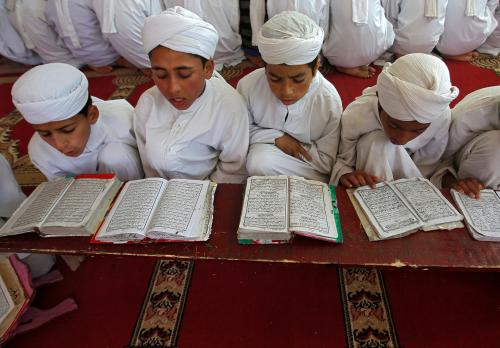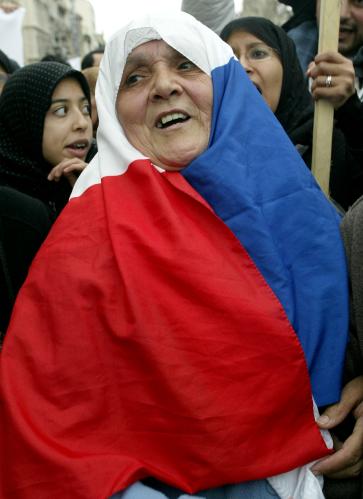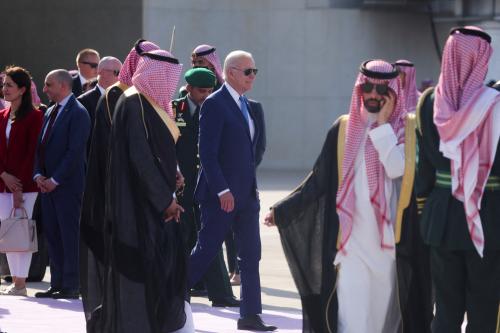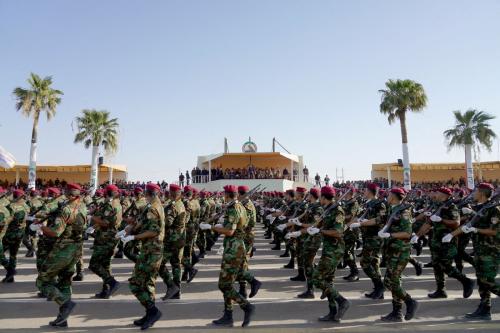This post is part of a series of analyses on the geopolitics of religious soft power.
When considering Saudi Arabia’s religious soft power, the West African nation of Mauritania offers an important case study. Mauritania, with somewhere between three and four million people, has nowhere near the “religious market” that Saudi Arabian religious institutions and actors find in populous countries such as Indonesia and Nigeria. Yet Mauritania’s deep-rooted culture of Islamic scholarship makes it an attractive, if not exactly malleable, partner country.
That same scholarly culture has meant that Mauritania has much to offer Saudi Arabia—making Mauritania not just a recipient of Saudi Arabian outreach, but also a contributor to Saudi Arabia’s own religious development. This understanding complements other analyses of Saudi Arabia as an importer (and not just exporter) of religious influences; it also challenges portrayals of Saudi Arabia as a hegemonic Muslim power able to shape “peripheral” countries’ Islam in whatever direction pleases the kingdom’s elites.
The View from Nouakchott
Mauritania’s connections with the Kingdom of Saudi Arabia began well before Mauritania’s independence from France in 1960. Leaving aside precolonial contacts, it is worth noting that French colonialism spurred pilgrimage to Mecca in two ways. For some West African Muslims, European colonialism motivated a religious hijra, or emigration, that took them all the way to the Hijaz. Other West African Muslims found that colonial rule offered new forms of mobility, from more peaceful foot journeys to railroads to steamships to airplanes—and that these paths could lead them to Mecca.
After Mauritania’s independence, the desert nation had strong reasons to embrace cooperation with Saudi Arabia. Mauritania’s powerful neighbor to the north, Morocco, was initially reluctant to acknowledge Mauritania’s existence, with some prominent Moroccans claiming Mauritania as part of “greater Morocco.” Indeed, Morocco only recognized Mauritania in 1969, at the founding meeting of the Organization of Islamic Cooperation in Rabat. During this period, Saudi Arabian friendship was forthcoming. Mauritania’s first president, Mokhtar Ould Daddah, credited King Faisal’s intervention with helping to broker the Moroccan-Mauritanian thaw, and King Faisal and Ould Daddah met periodically during the years leading up to the former’s assassination in 1975. When the king toured five African nations in 1972, Mauritania was one of his stops.
This period, in which Mauritania was establishing itself as an independent state, coincided with the advent of a concerted drive on the part of Saudi actors to extend their own religious influence abroad. Part of the context to this development from the early 1960s was the struggle that was underway at the time for regional dominance within the Middle East, between the Saudi monarchy and left-leaning republican regimes like Gamal Abel Nasser’s Egypt; however, societies in Africa also emerged as important sites for Saudi state-backed Islamic missionary work. Over time, Saudi influence came to operate through support for mosque construction, charitable projects, individual preachers, religious schools and Islamic centers, by a range of institutions with varying degrees of proximity to the Saudi state—including the Muslim World League (established in 1962), the Ministry for Islamic Affairs, and the Haramayn Charitable Foundation. The legacies of this period remain visible in Nouakchott. The city’s main mosque continues to be known, colloquially, as “the Saudi mosque.” Later, Saudi Arabia would sponsor the creation of an entire institute dedicated to the propagation of Salafism/Wahhabism, although the institute was shut down in the early 2000s amid a regime crackdown on Islamists.
Another Saudi state-run missionary project that made substantial inroads in Mauritania is the Islamic University of Medina (IUM), established in 1961 to provide fully-funded religious training in Medina to non-Saudi students in the hope that they would then promote Salafi norms in their countries of origin and elsewhere. By the early 2000s, nearly 400 IUM scholarships had been offered to young Mauritanian men and nearly 200 had graduated with university-level qualifications. These numbers are far higher, relative to the size of Mauritania’s population, than the equivalent figures for other major Muslim-majority societies like Indonesia or Egypt.
It was certainly not the case, however, that such Saudi influence overwhelmed the Mauritanian religious sphere. For many scholars, the dominant religious references remained the classical paradigm of northwest Africa—the Ash‘ari creed, the Maliki school of jurisprudence, and membership in a Sufi order. All of these, especially Ash‘arism and Sufism, are rejected by Salafis/Wahhabis and are officially frowned upon in Saudi Arabia. Yet the classical paradigm of northwest Africa holds continued sway, even hegemony, in many of Mauritania’s Islamic schools or mahadir (singular mahdara). Moreover, scholars with classical or neo-classical outlooks served prominently as ministers of Islamic affairs or as heads of religious associations throughout the post-colonial period and up to the present.
Even Mauritanian scholars whose outlook is much closer to the Saudi Arabian religious establishment’s take care to show their independence. Among an older generation, now largely deceased or aging, Buddah Ould al-Busayri (1920-2009) came to have significant overlap with Salafis in terms of creed and legal methodology. As imam of the “Saudi mosque,” as the quasi-official (though stubbornly non-salaried) “mufti of Mauritania,” and as the mentor to several generations of Islamist and Salafi activists, al-Busayri wielded significant influence. He enjoyed warm relations with Saudi Arabian scholars, particularly ‘Abd al-‘Aziz Ibn Baz (1910-1999), a prominent pro-government scholar who eventually became Grand Mufti. Yet al-Busayri remained committed, at least nominally, to the Maliki school of jurisprudence, and there is some evidence that he returned to Sufism at the end of his life.
Among a younger generation, Muhammad al-Hasan Ould al-Dedew (born 1963) represents another complex case. The grandson of a leading classical scholar, al-Dedew went on to study in Saudi Arabia. He became a conspicuous regime critic after Mauritania’s recognition of Israel in 1999. In recent years, al-Dedew has defied easy categorization in both theological and political terms. On the theological plane, even in interviews on Gulf satellite television he has shown himself open to welcoming Ash‘aris and Sufis into the Sunni fold, and at home he has publicly and warmly offered respect to the heads of Sufi orders. On the political plane, he remains associated with the mainstream Islamist tendency in Mauritania and abroad, but he has also partnered with the government on occasion, most prominently during dialogues with imprisoned, suspected jihadis and hardline Salafis starting in 2010. If al-Dedew still bears the stamp of his studies and work in Saudi Arabia, he cannot be called a Saudi puppet.
The View from Riyadh
While these dynamics illustrate the limitations and ambivalences of Saudi religious influence in Mauritania, the picture is further complicated when one considers the corresponding ways in which connections to Mauritania played out within the Saudi religious sphere.
The long history of Mauritanian migration to the Hijaz gave rise to a substantial presence of Mauritanians studying and teaching in that region’s mosques, administering schools and waqf (charitable endowment) foundations, or giving lessons in their homes. After the Hijaz came under Saudi rule in the 1920s, Mauritanian scholars took up posts in the Saudi state-directed religious and educational spheres. Mauritanian migrants, including Muhammad al-Amin al-Shinqiti and Muhammad al-Mukhtar al-Shinqiti, were appointed to teach at the Scholastic Institute in Riyadh, an important center established in the mid-20th century as part of efforts to formalize and expand the mechanisms for religious educational provision at the disposal of the Wahhabi scholarly establishment. Muhammad al-Amin later rose to the heights of the Wahhabi religious elite, becoming one of the very few non-Saudi scholars ever to be appointed to the country’s Council of Senior Scholars.
Despite hailing from a country with very different religious traditions, many such figures appear to have integrated quite thoroughly into the Wahhabi cultural milieu. Some are said to have departed their homeland in the first place because of what they perceived to be religious misguidance prevalent in Mauritanian society. For others, their experiences after arriving in Saudi Arabia appear to have been formative. While Muhammad al-Amin al-Shinqiti is said to have been skeptical about Wahhabism prior to settling in the Hijaz, it was reputedly his exposure in that context to major texts of the Hanbali school of law and works by Ibn Taymiyya and Ibn Qayyim that led him to adopt a line more in keeping with Wahhabi norms.
Having carved out spaces for themselves within the Saudi religious field, some Mauritanians were vocally critical of religious traditions that prevailed in their country of origin. An example is Muhammad al-Qalawi al-Timi, who was born in Mauritania in 1904. After settling in Saudi Arabia later in life, he was praised for the correctness of his religious doctrine by Ibn Baz and his writings included critiques of the Tijaniyya Sufi order which has a strong presence in Mauritania. Such migrants were well placed to lend authenticity and expertise to a wider project of elaborating a defense of Wahhabi creed against Islamic traditions beyond the kingdom’s borders.
However, that these migrants integrated into the Wahhabi milieu does not mean that they were simply assimilated; rather, many made distinctive contributions. Muhammad al-Amin al-Shinqiti authored one of the few Qur’anic exegeses to find approval with Salafi/Wahhabi scholars in the contemporary era: his Adwa’ al-Bayan fi Iydah al-Qur’an bi-l-Qur’an (The Lights of Explanation in Making the Qur’an Clear By Means of the Qur’an).
Mauritanians themselves have contributed to the development of the Saudi religious sphere.
Posts held by Mauritanian migrants in Saudi Arabia also situated them at the heart of networks that have contributed to shaping modern Salafism beyond the kingdom. The Mauritanian Ahmad al-Jakani al-Ibrahimi, who relocated to Saudi Arabia in the mid-1950s and taught at the Haram mosque in Mecca, counted amongst his students Muqbil ibn Hadi al-Wadi’i, the progenitor of modern Salafism in Yemen. Similarly, Mauritanians played important roles in forging Saudi state-run institutions that were intended to exert Salafi influence beyond the kingdom. Both Muhammad al-Amin and Muhammad al-Mukhtar al-Shinqiti were among the small handful of scholars teaching at the IUM when it opened in the early 1960s, and Muhammad al-Amin also sat on the institution’s advisory council. Moreover, Muhammad al-Amin authored works for use in teaching at the IUM on subjects including legal methodology.
While it is thus clear that Saudi actors and institutions have sought to exert substantial religious influence in Mauritania, the case of Mauritania also illustrates the limitations and complexity of Saudi outreach. Not only is it the case that even Mauritanian scholars relatively sympathetic to the Wahhabi establishment have simultaneously guarded their own independence; it is also the case that Mauritanians themselves have contributed to the development of the Saudi religious sphere, with some even having a hand in forging the very same institutions that were intended to exert “Saudi” religious influence in their own country of origin and beyond.





Commentary
How Mauritania exports religion to Saudi Arabia—And not just the other way around
December 13, 2018